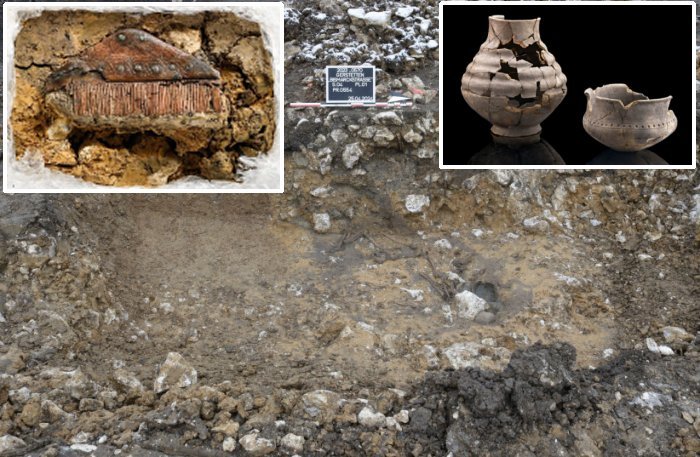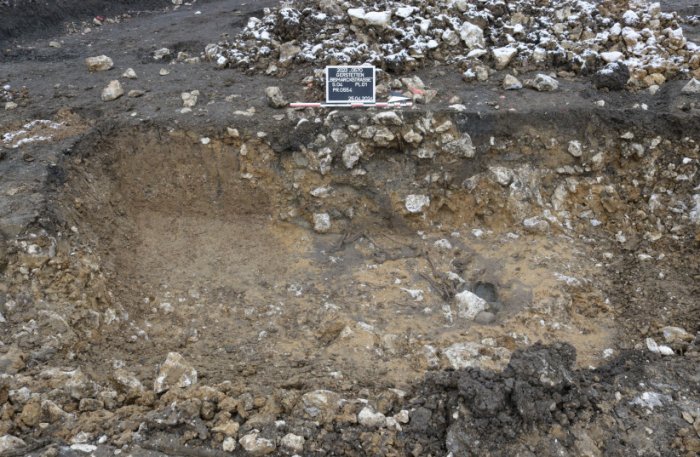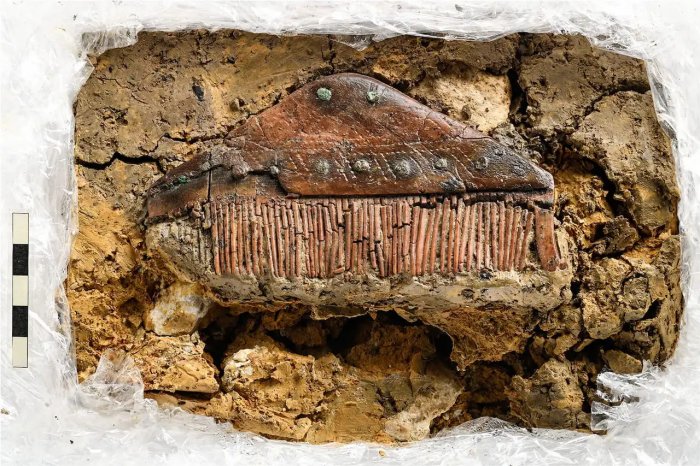Conny Waters – AncientPages.com – In the spring of this year, an early Alemanic grave body grave was accidentally unearthed in Gerstetten, Germany.
Ceramics discovered in the Alemannic tomb in Gerstetten, dated to the 4th century AD. Image credit: Yvonne Mühleis (State Office for the Conservation of Monuments of the Stuttgart Regional Council)
The archaeological company ArchaeoBW conducted a rescue excavation in the village center. This ancient place has been inhabited since late antiquity. The excavation was carried out on behalf of the Landesamt für Denkmalpflege (LAD) at the Stuttgart Regional Council.
Withing the area of the ancient settlement, archeologists found the the remains of a man in his 60s, dating back to the first half of the fourth century. The tomb, designed as a wooden chamber, featured an elaborate construction. Typical for its time period, it was notably distinguished by its solitary location.
Ceramic and glass vessels, in addition to a small comb, were meticulously preserved from the collection of gifts. A high-quality glass cup bears a striking resemblance to those unearthed in the nearby late Roman castle of Guntia (Günzburg), founded in about 70 BC by the Romans to defend the borders of their land along the Danube. The castle was known as Castellum Guntia, Gontia or Contia.
Otherwise, the remaining items exhibit distinct parallels to artifacts discovered in the Middle Elbe-Saale region.
A view of the grave discovered by archaeologists. Image credit: ArchaeoBW – State Office for the Conservation of Monuments of the Stuttgart Regional Council.
In Baden-Württemberg, early Alemannic graves are relatively scarce, typically found in small clusters of five to twelve graves. It is possible that additional graves may be discovered in the southern adjacent area, which has not yet been thoroughly investigated.
The artifacts were transported to the restoration workshop in Esslingen. The two ceramic vessels have already undergone restoration. The excavation company is still documenting the remaining excavation finds, along with the human bones.
A rib from the man was sampled for radiocarbon dating and sent directly from the excavation site to a laboratory in Mannheim. The results corroborate the typological dating of the grave goods, and suggest that the man likely died between 263 and 342 AD.
The comb unearthed in the Alemannic tomb fated to 4th century AD. Image credit: Yvonne Mühleis (State Office for the Conservation of Monuments of the Stuttgart Regional Council)
The archaeological investigations at the site will be continued at the end of the year.
The Alemanni were a Germanic people composed of tribes within the Germanic Suebi group. They settled in Germany, specifically south of the Main River and east of the Rhine. Many historians say these people are first mentioned in Roman writings in 213 AD, based on an account of a Roman attack on them. However, some researchers suggest that the Alemanni may have been recorded as early as 98 AD. Gerstetten (the Heidenheim district of Baden-Württemberg in the East Württemberg region) is an old small town that could date back to the late Merovingian period.
Written by Conny Waters – AncientPages.com Staff Writer








